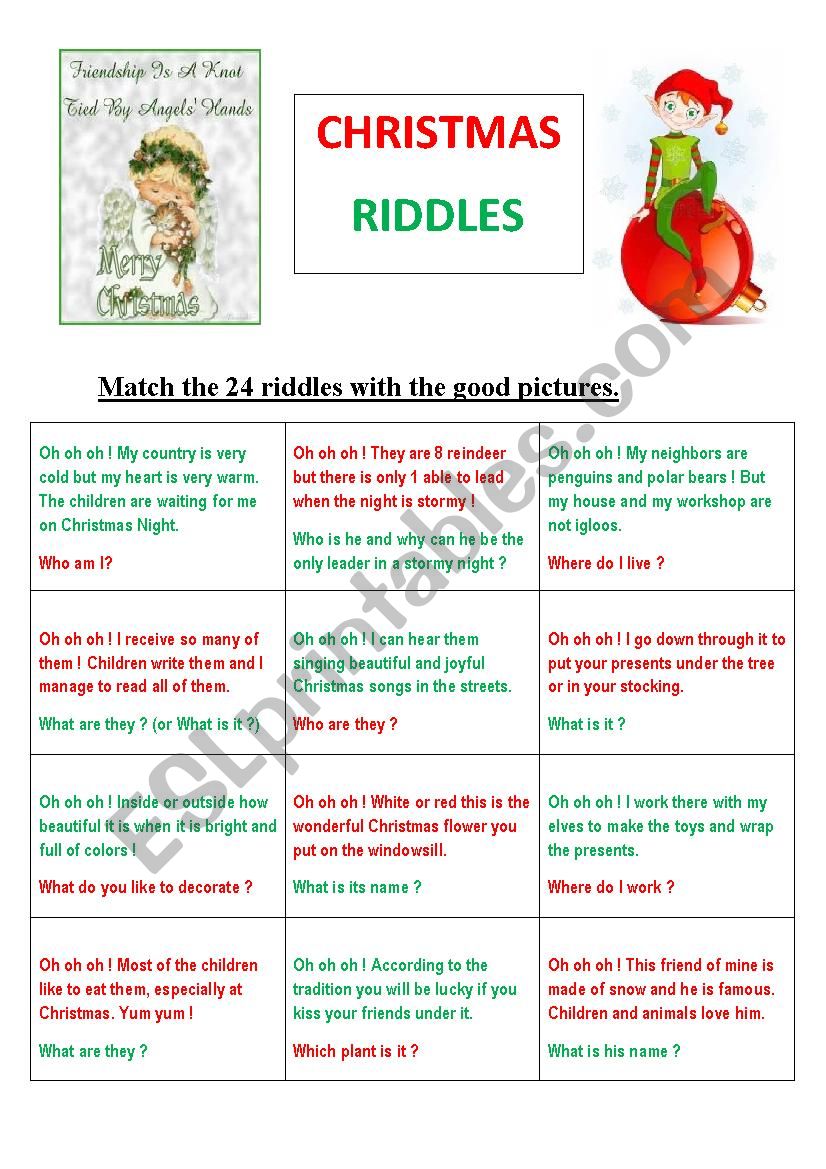The Enchanting World of Christmas Riddles in the UK
Related Articles: The Enchanting World of Christmas Riddles in the UK
Introduction
In this auspicious occasion, we are delighted to delve into the intriguing topic related to The Enchanting World of Christmas Riddles in the UK. Let’s weave interesting information and offer fresh perspectives to the readers.
Table of Content
The Enchanting World of Christmas Riddles in the UK

The festive season in the UK is synonymous with twinkling lights, hearty feasts, and the joyous exchange of gifts. However, there is another cherished tradition that adds a unique layer of merriment to the celebrations: Christmas riddles. These puzzles, often whimsical and challenging, have become an integral part of the holiday experience, fostering laughter, engaging minds, and strengthening family bonds.
A Brief History of Christmas Riddles in the UK
The origins of Christmas riddles can be traced back to ancient folklore and storytelling traditions. In medieval times, riddles were popular forms of entertainment during the Yuletide season, often woven into festive songs and performances. The Victorians, with their love for all things festive, further popularized these puzzles, incorporating them into Christmas games and social gatherings.
The Appeal of Christmas Riddles
Christmas riddles hold a special appeal for people of all ages. Their ability to spark curiosity, challenge intellect, and foster a sense of playful competition makes them a welcome addition to any festive gathering.
- Cognitive Stimulation: Riddles engage the mind, encouraging logical thinking, problem-solving, and lateral thinking skills. This mental exercise can be particularly beneficial for children, enhancing their vocabulary and cognitive development.
- Social Bonding: The shared experience of solving riddles creates a sense of camaraderie and connection. Families and friends gather around, engaging in friendly competition, fostering laughter, and creating lasting memories.
- Festive Spirit: Christmas riddles often incorporate themes and imagery associated with the holiday season, adding a touch of festive magic to the experience. They evoke a sense of wonder and joy, contributing to the overall celebratory atmosphere.
Types of Christmas Riddles
Christmas riddles can be categorized into various types, each offering a unique challenge and level of difficulty.
- Traditional Riddles: These riddles often focus on classic Christmas themes like Santa Claus, reindeer, snow, and Christmas trees. They typically rely on wordplay, metaphors, and imagery to challenge the solver.
- Trick Questions: These riddles often use wordplay and double meanings to mislead the solver. They can be humorous and challenging, requiring a keen eye for detail and an understanding of the nuances of language.
- Logical Puzzles: These riddles present a problem or scenario that requires logical deduction and reasoning to solve. They can be more complex than traditional riddles, requiring a systematic approach and analytical thinking.
Examples of Christmas Riddles
Here are some classic examples of Christmas riddles that have been enjoyed by generations:
- What has an eye but cannot see? (A needle)
- What is always coming, but never arrives? (Tomorrow)
- What has no voice but can speak to you? (A book)
- What is full of holes but can still hold water? (A sponge)
- What is red and white and comes down a chimney? (Santa Claus)
FAQs about Christmas Riddles in the UK
Q: Where can I find Christmas riddles?
A: Christmas riddles can be found in a variety of sources, including:
- Online Resources: Websites dedicated to riddles, holiday-themed blogs, and social media platforms often feature Christmas riddles.
- Books: Numerous books dedicated to Christmas riddles are available in bookstores and online retailers.
- Magazines and Newspapers: Many publications feature Christmas riddles in their holiday editions.
- Family Traditions: Some families have their own collections of traditional Christmas riddles passed down through generations.
Q: What are some tips for creating Christmas riddles?
A: Crafting effective Christmas riddles requires a combination of creativity, wordplay, and a keen understanding of the holiday season. Here are some tips:
- Focus on Christmas Themes: Incorporate elements like Santa Claus, reindeer, Christmas trees, snow, and gifts into your riddles.
- Use Wordplay and Metaphors: Employ puns, double meanings, and metaphors to make your riddles engaging and challenging.
- Start with a Simple Question: Frame your riddle with a clear and concise question that sets the stage for the puzzle.
- Provide Clues: Offer subtle hints or clues within the riddle to guide the solver towards the answer.
- Test Your Riddles: Share your riddles with friends and family to get feedback and ensure they are clear, engaging, and solvable.
Q: How can I use Christmas riddles in my celebrations?
A: Christmas riddles can be incorporated into various festive activities:
- Family Games: Use riddles as part of a Christmas-themed game night, awarding points for correct answers.
- Gift Exchange: Include a riddle with each gift, requiring the recipient to solve the puzzle to uncover the present.
- Decorations: Create festive decorations with riddles written on paper or cards, adding a touch of intellectual challenge to your décor.
- Christmas Eve Tradition: Make solving riddles a part of your Christmas Eve traditions, creating a fun and engaging activity for the whole family.
Conclusion
Christmas riddles are a cherished tradition that adds a unique layer of enjoyment to the festive season in the UK. They provide a platform for intellectual engagement, social bonding, and a celebration of the holiday spirit. Whether enjoyed during a family gathering, a Christmas party, or simply as a quiet pastime, these puzzles offer a delightful way to embrace the magic of the season and create lasting memories.








Closure
Thus, we hope this article has provided valuable insights into The Enchanting World of Christmas Riddles in the UK. We hope you find this article informative and beneficial. See you in our next article!